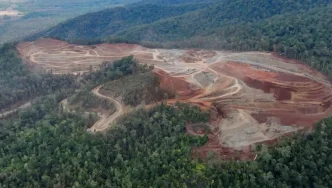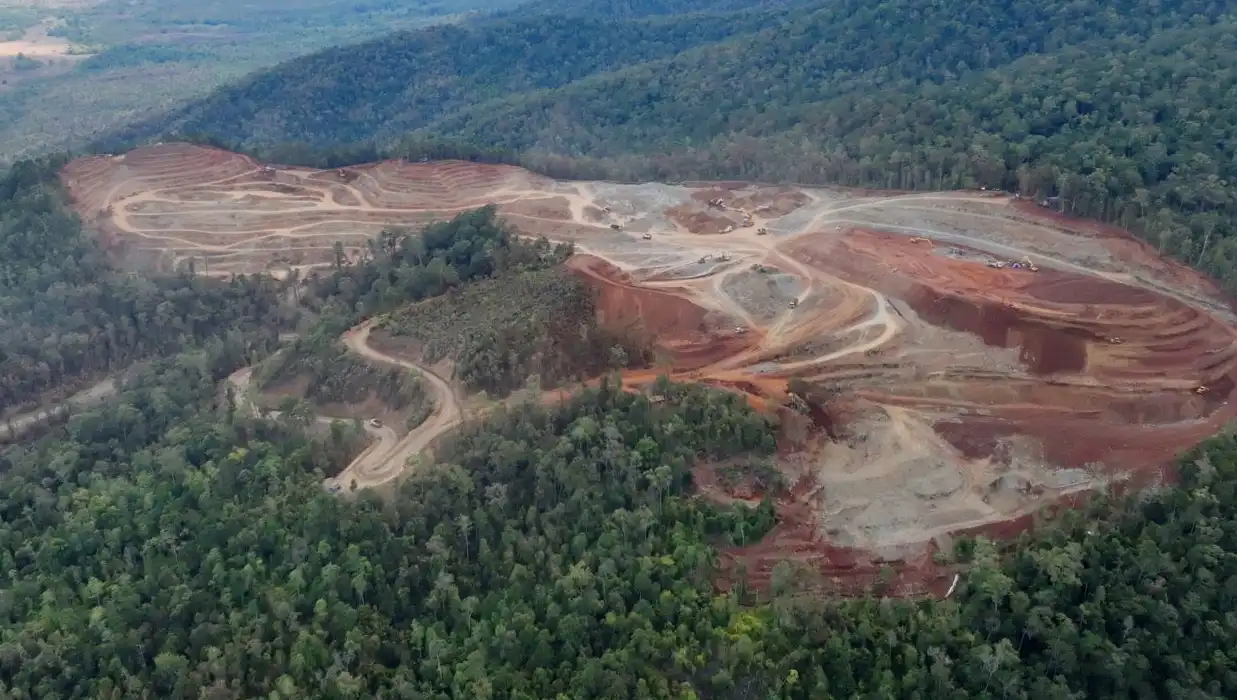In the coastal city of Sorong, Southwest Papua, hundreds of Papuans took to the streets on June 10, 2025, demanding the immediate revocation of nickel mining permits in the ecologically sensitive Raja Ampat archipelago. Carrying placards with messages like “Revoke all nickel mining permits in Raja Ampat immediately,” protesters marched to the Southwest Papua Governor’s office, voicing their anger over environmental destruction and the perceived impunity of mining companies. The demonstration has reignited a fierce debate over Indonesia’s resource extraction policies, balancing economic ambitions with the urgent need to protect one of the world’s most biodiverse marine regions.
Rising Tensions Over Environmental Harm
The Raja Ampat islands, often dubbed the “Amazon of the seas” for their unparalleled marine biodiversity, have become a flashpoint in Indonesia’s ongoing struggle to reconcile industrial development with environmental preservation. Recent videos circulating on social media have amplified public outrage, allegedly showing ships transporting nickel ore from the region and visible damage to the islands’ fragile ecosystems. According to an analysis by Greenpeace Indonesia, over 500 hectares of forest and vegetation have been destroyed on the small islands of Gag, Kawe, and Manuran due to mining activities. The environmental NGO argues that such operations violate regulations reinforced by a 2023 Constitutional Court ruling, which designates small islands as off-limits to mining.
Activists and local communities fear that the destruction could irreversibly harm Raja Ampat’s coral reefs, which host over 1,500 species of fish and 75% of the world’s known coral species. The region’s tourism industry, a vital source of income for many Papuans, also hangs in the balance. “If the reefs die, our livelihoods die with them” said a local fisherman during the Sorong protest, echoing the sentiments of many who depend on the islands’ natural beauty to attract visitors from around the globe.
Government Response and Permit Revocations
In a significant development, the Indonesian government announced on June 11, 2025, the revocation of mining permits for four out of five companies operating in Raja Ampat. State Secretary Prasetyo Hadi confirmed the decision, citing violations of regulations by the companies—PT Kawei Sejahtera Mining, PT Mulia Raymond Perkasa, PT Anugerah Surya Pratama, and PT Nurham. Energy and Mineral Resources Minister Bahlil Lahadalia noted that these companies had failed to submit their 2025 Work Plan and Budget applications, a mandatory requirement for legal operations. However, PT Gag Nikel, the fifth company, was allowed to continue after securing the necessary documentation.
While the permit revocations have been hailed as a partial victory by environmentalists, many remain skeptical about the enforcement of these measures. Critics point to a history of lax oversight in Indonesia’s mining sector, where companies often resume operations under new permits or through subsidiaries. The decision to allow PT Gag Nikel to persist has also drawn ire, with activists questioning whether political or economic interests are overshadowing environmental concerns. “This is a step forward, but it’s not enough” said a spokesperson for Greenpeace Indonesia. “All mining must stop to protect Raja Ampat.”
Allegations and Denials Surrounding Political Connections
The controversy has taken on a political dimension with unverified allegations circulating online that link former President Joko Widodo, popularly known as Jokowi, and his wife Iriana to nickel mining activities in Raja Ampat. Social media posts have pointed to ships allegedly transporting nickel ore with names resembling the former president’s initials, such as TB JKW Mahakam and barge Dewi Iriana. Data from the Transportation Ministry confirms the existence of multiple vessels named JKW Mahakam (eight in total) and Dewi Iriana (six in total), registered under various companies, including subsidiaries of PT IMC Pelita Logistik and PT PSS.
However, Minister Bahlil Lahadalia has categorically dismissed any connection between the former president and the mining operations. Speaking at the Presidential Palace in Jakarta on June 11, 2025, he stated, “Oh, that’s not true. Where is that [allegation] coming from?” as reported by Kompas. He further denied claims that mining business permits for Raja Ampat were issued under Jokowi’s administration. As of now, no evidence has been presented to substantiate the allegations of personal involvement, and ownership records indicate the vessels are affiliated with private companies, not individuals tied to the former president.
Despite the official denials, the naming of the vessels has fueled public speculation and mistrust, particularly among Papuan communities who feel marginalized by Jakarta’s resource policies. The controversy underscores broader concerns about transparency in Indonesia’s mining industry, where political influence and corporate interests often intersect.
Economic Stakes and Global Demand for Nickel
Indonesia’s push to expand nickel production is driven by global demand for the metal, a critical component in electric vehicle batteries and renewable energy technologies. As the world’s largest nickel producer, the country has sought to capitalize on this market, with the government under President Prabowo Subianto continuing policies initiated during Jokowi’s tenure to attract foreign investment in downstream processing. Raja Ampat’s nickel deposits, though relatively small compared to reserves in Sulawesi, represent a piece of this lucrative puzzle.
Yet, the economic benefits come at a steep cost. Local communities in Southwest Papua argue that mining revenues rarely trickle down to them, while the environmental damage threatens their traditional ways of life. The destruction of over 500 hectares of forest, as documented by Greenpeace, also raises questions about Indonesia’s commitment to its climate goals under the Paris Agreement. Deforestation and habitat loss in Raja Ampat contribute to carbon emissions, undermining national pledges to reduce greenhouse gases.
Moreover, the financial scale of mining operations in Raja Ampat, while not fully disclosed, involves significant investments. Local media reports suggest operational costs for companies in the region include equipment and labor expenses estimated at 1.2 billion Indonesian Rupiah (US$75,000) per month for mid-sized firms. These figures, while substantial, pale in comparison to the potential long-term economic losses from diminished tourism and fisheries if environmental degradation continues unchecked.
Legal and Policy Challenges
The legal framework surrounding mining in Raja Ampat remains a contentious issue. A 2023 Constitutional Court ruling explicitly protects small islands from extractive industries, a decision environmentalists argue should apply to Gag, Kawe, and Manuran. However, enforcement has been inconsistent, with local governments and national authorities often at odds over jurisdiction and economic priorities. The revocation of permits for four companies signals a potential shift, but the exemption of PT Gag Nikel suggests that loopholes or discretionary powers may still undermine protective regulations.
Activists are now calling for a comprehensive audit of all mining permits in Raja Ampat and a moratorium on new concessions until stricter safeguards are in place. They also demand greater involvement of Papuan communities in decision-making processes, arguing that indigenous rights to land and resources have been sidelined. “The people of Papua must have a say in what happens to our land and sea” said a protest organizer in Sorong, reflecting a broader push for autonomy and self-determination in the region.
Looking Ahead: A Fragile Balance
As Indonesia grapples with the fallout from the Raja Ampat mining controversy, the protests in Sorong serve as a stark reminder of the tensions between development and conservation. The partial revocation of permits offers a glimmer of hope for environmentalists, but the continued operation of PT Gag Nikel and the lack of clarity around enforcement raise doubts about the government’s resolve. Meanwhile, unverified allegations of political connections, though dismissed by officials, continue to erode public trust in the transparency of resource governance.
For the people of Southwest Papua, the fight to protect Raja Ampat is not just about preserving coral reefs or forests—it’s about safeguarding their cultural heritage and economic future. As the global demand for nickel intensifies, the question remains whether Indonesia can strike a sustainable balance or if the allure of short-term profits will prevail over long-term ecological and social well-being.















